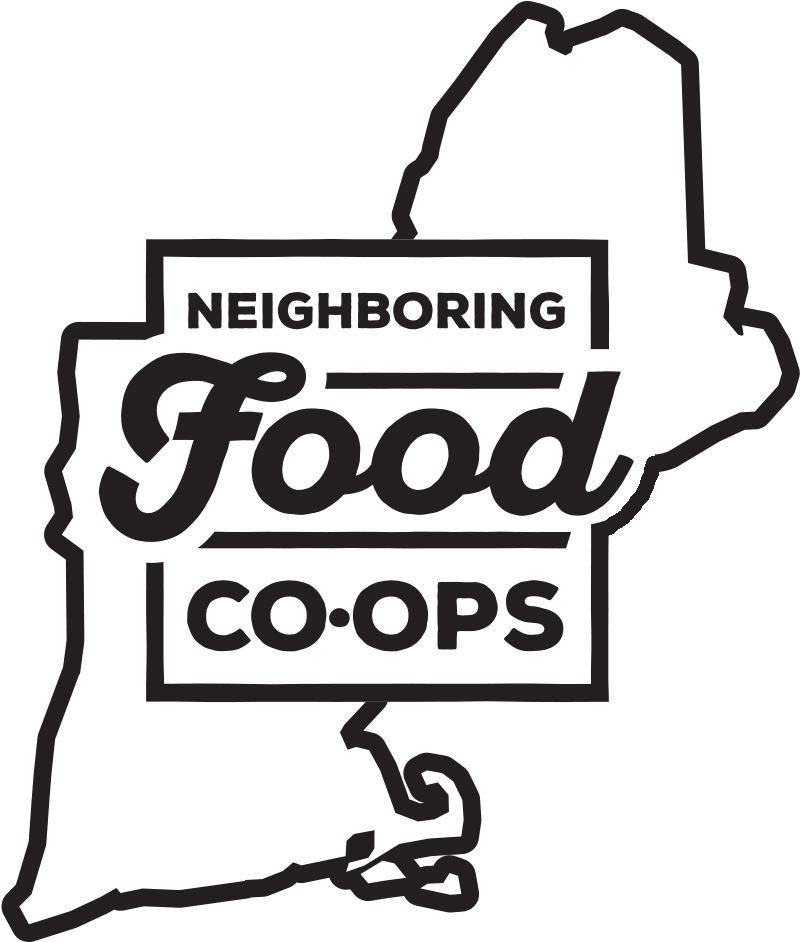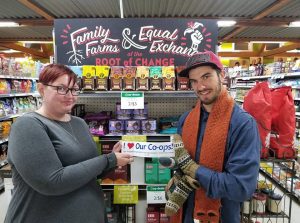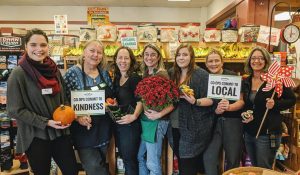
Your Neighboring Food Co-ops
Locally Owned by More Than
100,000 People Like You!
In this month’s E-news, check out:
- Co-ops See the Future: Happy Co-op Month!
- ACTION ALERT: Employee Ownership Act a Victory for Co-ops
- Eat Your (Co-op) Peas!
- GreenStar’s Expansion Catches International Press
- EPA Recognizes Hanover Co-op Food Stores with National Award
- Training: Enhancing Co-op Business Performance
- October’s Cave to Co-op Special
- Farmers Union Celebrates Co-op Month
- Upcoming Events
Co-ops See the Future: Happy Co-op Month!
The Neighboring Food Co-op Association (NFCA) is celebrating Co-op Month in style!
Your Neighboring Food Co-ops across the Northeast joined over 40,000 co-ops and credit unions across the United States in celebrating Co-op Month this October.
Locally, food co-ops have  been celebrating Co-op Month and how “Co-ops See the Future” with their commitment to building a more sustainable, equitable, and inclusive economy for everyone with celebrations across New England/New York including:
been celebrating Co-op Month and how “Co-ops See the Future” with their commitment to building a more sustainable, equitable, and inclusive economy for everyone with celebrations across New England/New York including:
- Brattleboro Food Co-op, Middlebury Naturals Foods Co-op, Putney Food Co-op & Springfield Food Co-op were all winners in the Co-op Month Photo Competition
- City Market/Onion River Co-op (VT) celebrated Co-op Month and their community impact with over 500 people at their Annual Meeting
- Fiddleheads Food Co-op (CT) is holding a Membership Drive and Raffle
- GreenStar Co-op Markets (NY) is spreading the word about Co-op Impact with their Co-op Month Fast Facts
- Monadnock Food Co-op (NH) is highlighting cooperatively owned vendors, contributing to the Howard Bowers Fund and honoring a “Cooperator of the Year” at their Annual Meeting
- Portland Food Co-op (ME) is having a sale on everything made by co-ops all month long
- Urban Greens Co-op (RI) is holding a Membership Drive to make sure Urban Greens succeeds when they open their doors this year and is accountable to their community members
- Wild Oats Market Co-op (MA) is hosting a screening of Food For Change and promoting Co-op Products in their store
Want to know more about Co-op Month? https://nfca.coop/Co-opMonth

Thanks to CoBank for their support of our Neighboring Food Co-ops
ACTION ALERT: Employee Ownership Act a Victory for Co-ops
Why should food co-ops care about a law related to employee ownership? Read on and learn more about how you can TAKE ACTION to support co-ops!

In August, the Main Street Employee Ownership Act was passed into law — a rare example of bipartisan collaboration at a time of great contention in DC, and a victory for worker ownership and co-operative enterprise in general.
Introduced by Senator Kirsten Gillibrand (D-NY) and Representative Nydia Velasquez (D-NY), this legislation comes at a key moment in the evolution of small business in the United States. Baby Boomers own nearly half of the privately-held businesses in our country, providing employment for 1 in 6 workers. And as these small business owners retire, a “Silver Tsunami” will put these companies and the jobs they provide at risk. Only a small percentage of these enterprises will be passed on to family members or sold to other buyers.
“This legislation fills an important gap,” said Rep. Velasquez, “allowing many of these firms to transition to an employee-owned structure, keeping the businesses intact and retaining jobs in the local community.”
The law seeks to transform the challenge of business succession into an opportunity, providing a path to retirement for business owners and creating an ownership stake for employees through Worker Co-ops and Employee Stock Ownership Programs (ESOPs), directing the Small Business Administration (SBA) to work with the nation’s network of 900 Small Business Development Centers to provide lending and transition-related technical training, executive education, and one-on-one consulting for business owners.
So, why should food co-ops care about a law related to employee ownership?
“As community-owned enterprises, food co-ops are dedicated to building stronger local economies,” said Erbin Crowell, Executive Director of the Neighboring Food Co-op Association (NFCA). “This legislation aims to preserve local businesses through worker co-ops and employee ownership. If implemented effectively, it will also open the way for other co-operatives to work with the SBA to grow good jobs and community wealth.”
The NFCA was an early supporter of the Main Street Employee Ownership Act and Crowell, who also serves on the Board of the National Cooperative Business Association (NCBA CLUSA) contributed to the final language of the law, including recognition of the contribution of the wider co-operative movement to employee ownership, the importance of co-operative legal statutes and regulations, and the role of co-operative associations in advocacy and economic development.
The legislation also calls for the elimination of obstacles that co-ops have faced in receiving SBA support, stating that “it is the sense of Congress that co-operatives have a unique business structure and are unable to access the lending programs of the [SBA] effectively due to loan guarantee requirements.” Specifically, the requirement of personal guarantees has disqualified co-ops, due to the fact that they typically have large numbers of members who each own small shares in the business. As a remedy, the Act calls on the SBA to “recommend practical alternatives for co-operatives that will satisfy the loan guarantee requirements of the Administration.” This means that co-ops may finally be able to access to support already available to other small businesses.
“One of the biggest challenges for food co-ops is the inability to access the SBA loan programs,” said R.L. Condra, Vice President of Advocacy of the National Cooperative Bank (NCB). “With this monumental legislation, Congress is directing the SBA to level the playing field for co-operative businesses.”
Addressing this and other issues related to a lack of awareness of co-op enterprise will be key to the successful implementation of this law. Likewise, the SBA, lenders, and local technical assistance providers will need to be educated regarding the difference between co-operatives and other models of employee ownership such as ESOPs. This is where language in the legislation related to legal statutes and regulations is very important.
A co-operative is a unique business model that is owned and democratically controlled by the people who use it to meet their needs, whether they be products, services, and/or employment. These user-owners are called “members” because their eligibility for ownership is linked to their participation in the business, not simply the ownership of shares, and the benefits of this patronage are derived and distributed equitably on the basis of use. For these reasons, it is important that the Act defines co-ops “in accordance with applicable Federal and State laws and regulations” that include provisions related to member ownership, governance, and how resources are distributed among member-owners.
Significantly, the Act refers to co-operatives in general, which includes co-ops in which employees can be members along with other stakeholders such as consumers. For example, the member co-ops of the Neighboring Food Co-op Association (NFCA) employ 2,300 people across New England and New York State. These employees also have access to member-ownership in their co-ops, helping to secure good local jobs, infrastructure, and economic activity and participating in election of the Board of Directors.
Finally, the law calls on the SBA to establish a Small Business Employee Ownership and Co-operatives Promotion Program to offer technical assistance and training on the transition to employee ownership in coordination with co-op development centers and “local, regional, and national co-operative associations.” This means that co-ops themselves can contribute to implementation of the Act through regional federations such as the NFCA and the Valley Alliance of Worker Co-ops, and national organizations such as the US Federation of Worker Co-ops and the National Cooperative Business Association (NCBA CLUSA).
“We’re particularly pleased that the act requires SBA to coordinate with co-operative associations and development centers, which are natural partners in efforts to create better jobs and a fairer economy,” said Doug O’Brien, President and CEO of NCBA CLUSA.
While this Act is focused on the potential of worker ownership in addressing the challenge of business succession and retaining vital economic infrastructure, we know that this a strength shared by co-operatives across sectors. Here in our region, we have seen co-ops used as a successful model for ownership succession with examples including worker co-ops Real Pickles in Greenfield, MA, and community-owned co-ops like Old Creamery Co-op in rural Cummington, MA. With this legislation, there is the potential for additional resources and support for similar conversions that will help retain jobs and community infrastructure, and build a more inclusive economy for everyone.
The successful passage of the Main Street Employee Ownership Act is not just a victory for worker co-ops. It also opens the way for recognition of the contribution of co-operatives of all kinds to local economies, and the removal of obstacles that prevent them from taking advantage of SBA loans and services available to other businesses. Whether we are talking about worker co-ops or food co-ops, credit unions or farmer co-ops, housing co-ops or artisan co-ops, we know that co-operative enterprises help build stronger communities. You can help ensure that the Act is implemented in a way that will enable worker co-ops — and co-operatives of all kinds — to grow, creating good jobs and building a more sustainable, resilient, and inclusive economy that works for everyone.
YOU CAN TAKE ACTION. Food Co-ops and their individual members can help ensure the success of the Main Street Employee Ownership Act in a few ways:
- Contact your Senators and Representatives. Share how your food co-op and other co-ops have made a difference in your community and across our region, creating good jobs, building wealth, and growing local economies. For example, the Neighboring Food Co-op Association includes 35 food co-ops and start-ups, locally owned by more than 140,000 people, employing 2,300 people, and selling more than $90 million in products from local suppliers. Ask them to encourage the SBA to quickly begin implementing the Main Street Employee Ownership Act, specifically by replacing the personal guarantee requirement for SBA loans to co-ops with a practical alternative, and helping them to grow and serve their communities.
- Write to the SBA Northeast Regional Office and your local Small Business Development Center. Share the impact that your food co-op has had on the local economy and how together the Neighboring Food Co-op Association includes 35 food co-ops and start-ups, locally owned by more than 140,000 people, employing 2,300 people, and selling more than $90 million in products from local suppliers. Tell them that you want SBA headquarters to carry out the Main Street Employee Ownership Act as soon as possible, specifically by replacing the personal guarantee requirement for SBA loans to co-ops with a practical alternative, and that your food co-op can be a local partner in its implementation.
- Join the National Cooperative Business Association (NCBA CLUSA). Membership in NCBA CLUSA gives you a direct and powerful connection to policymakers, and helps them to advance, promote and defend co-operative business and advocate for legislation like the Main Street Employee Ownership Act before federal legislators and the Administration. Membership is available to individuals and organizations, and NFCA Member Food Co-ops can join at a special discount. For more information, visit their webpage or e-mail Stephen McDow at SMcDow@ncba.coop.
For more information and resources for action, please visit: https://nfca.coop/actionmseoa/
Eat Your (Co-op) Peas!
Our farmers have been working hard to bring us fresh fruits and  vegetables throughout the season. We can enjoy a variety of local vegetables for healthy family meals and support family farmers all year long by choosing Neighboring Food Co-op Association (NFCA) Blueberries, Organic Edamame, Organic Green Beans, and non-GMO Sweet Corn and now Green Peas too— all are all grown and packaged right here in the Northeast, and available only at your food co-op!
vegetables throughout the season. We can enjoy a variety of local vegetables for healthy family meals and support family farmers all year long by choosing Neighboring Food Co-op Association (NFCA) Blueberries, Organic Edamame, Organic Green Beans, and non-GMO Sweet Corn and now Green Peas too— all are all grown and packaged right here in the Northeast, and available only at your food co-op!
Your local food co-op has the ingredients you need for making soups, lunches, and special meals including our frozen fruits and vegetables to keep it local and easy to prepare. Look for our Northeast Grown Frozen Fruits and Vegetables in the freezer section. They’re easy to find because they’re packed in a clear package, so you can see what’s inside.
Here is a great way to enjoy peas with family and friends. Easy to make with frozen peas, this tasty dip goes well with corn chips for appetizer or snack on the go.
Pea Dip
vegan, gluten-free, easy and quick to make
- 2 cups NFCA frozen peas
- 3 cloves garlic
- ½ small onion, chopped
- 4 tbsp virgin olive oil
- 1/4 tsp salt
- ¼ tsp fresh lemon juice
- chives, for garnish
- Let peas thaw at room temp for 10 to 15 minutes.
- In a food processor or blender combine the garlic, peas, olive oil, onion, lemon, and salt.
- Blend until smooth.
- Scoop into bowl, garnish with chopped chives.
Corn chips or crostini work well for dipping.
For more Farm to Freezer information and more recipes visit: www.nfca.coop/farmtofreezer.
GreenStar’s Expansion Catches International Press
The expansion of GreenStar Natural Foods Market Co-op in Ithaca,  NY gained international attention in a recent article in Co-operative News.
NY gained international attention in a recent article in Co-operative News.
GreenStar Naturals Foods Market, “is offering its members the chance to invest in its future as it plans a huge expansion that will create 40 jobs and offer customers a more culturally diverse product line, with more local, organic, and Fair Trade products.
The food retailer is planning a move to a new site almost three times larger than existing premises – promising a better shopping experience with wider, accessible aisles and more space, as well as a larger deli, produce department and car park.
GreenStar has launched an Owner Investment Programme, inviting members to buy investment shares to raise $2.5m towards the cost of moving and expanding the business. Shares are non-voting, preferred stock that provide owners the opportunity to invest in a community-owned, local business while earning a fair return on their investment.
General manager, Brandon Kane, said: ‘We stand on the verge of a historical level of growth for our co-op with the imminent expansion and relocation of our West End store in 2020. This resizing of GreenStar will increase the benefits produced for our community.
‘We expect sales to local farms and business to reach $8 million by 2021. Our plan calls for adding forty full-time-equivalent jobs at a living wage and tackling tough energy questions in a quest to make the most sustainable energy choices feasible for our new home.'”
Read more here: https://www.thenews.coop/132557/sector/retail/us-grocery-co-ops-big-plans-expansion/
EPA Recognizes Hanover Co-op Food Stores with National Award
The U.S. Environmental Protection Agency (EPA) recognized 13  organizations, including Co-op Food Stores, in the supermarket industry for their achievements in protecting human health and the environment under its GreenChill Partnership Program. The GreenChill Partnership works with food retailers to reduce refrigerant emissions and decrease their impact on the ozone layer by supporting a transition to environmentally friendlier refrigerants, lowering charge sizes and eliminating leaks, and adopting green refrigeration technologies and best environmental practices.For the second straight year, the Hanover Consumer Cooperative Society’s four food stores earn the Environmental Protection Agency’s award for Most Improved Emissions Rate.
organizations, including Co-op Food Stores, in the supermarket industry for their achievements in protecting human health and the environment under its GreenChill Partnership Program. The GreenChill Partnership works with food retailers to reduce refrigerant emissions and decrease their impact on the ozone layer by supporting a transition to environmentally friendlier refrigerants, lowering charge sizes and eliminating leaks, and adopting green refrigeration technologies and best environmental practices.For the second straight year, the Hanover Consumer Cooperative Society’s four food stores earn the Environmental Protection Agency’s award for Most Improved Emissions Rate.
Ed Fox, general manager of the Hanover Co-op Food Stores said, “It’s so great to see food cooperatives recognized for their long-standing work on issues of environmental responsibility.”
Read more here: http://coopnews.coop/epa-recognizes-hanover-co-op-food-stores-with-national-award-2/

Thanks to National Cooperative Bank for their support of our Neighboring Food Co-ops
October’s Cave to Co-op Special
October’s Cave to Co-op Cheese Special: Très Bonne, Boston Post Dairy, Enosburg Falls, VT
Très Bonne Reserve, a goat milk cheese, is aged for 12-14 months and has a caramelized nutty flavo r and a flaky, almost crunchy texture.
r and a flaky, almost crunchy texture.
Boston Post Dairy is located on the Gervais Family Farm, a familyrun farm in northern Vermont owned and operated by Robert and Très Bonne Gervaise and their children. The Gervaise family has been farming the property since 1962. In 2013 their farm was given the prestigious Vermont Dairy Farm of the Year award which yearly honors an outstanding, efficiently managed dairy enterprise. The Dairy is home to 70 dairy goats and 80 dairy cows. They make cheeses from goat milk, cow milk, and a blend of goat and cow milk.
Cave to Co-op is a partnership between Provisions International and the Neighboring Food Co-op Association (NFCA) to support artisanal cheese producers in our region and make their products more easily available to co-op shoppers. Each month, a delicious local cheese is featured at a great price.
Très Bonne is French for ‘very good’ and it is! Fantastic on its own, but try this recipe for a seasonal treat.
Spanish Tomato Bread with Très Bonne Reserve
makes 8 slices
- 8 slices of ciabatta
- extra-virgin olive oil for brushing and drizzling
- 2 halved garlic cloves
- 4 garden fresh ripe tomatoes, halved cross-wise
- sea salt and freshly ground pepper
- shaved Très Bonne Reserve for topping
Pre-heat oven to 375 °F
Brush one side of each bread slice with oil and arrange oiled side up on a baking sheet. Bake for 10 minutes, until golden. Rub the toasts with the garlic cloves, then rub with the tomato halves until all of the flesh is gone; discard the tomato skins. Season the toasts with salt and pepper. Top with cheese, drizzle with olive oil and serve.
More info and recipes:
https://nfca.coop/cave-to-co-op-october-2018/
For more information on Cave to Co-op, visit: www.nfca.coop/CaveToCo-op
Farmers Union Celebrates Co-op Month
NFU Hails Co-operatives and the Empowerment They Bring to Family Farmers, Rural America
This October, the National Farmers Union (NFU ) joined the co-operative community in kicking off National Co-op Month. NFU President Roger Johnson hailed the nation’s many and varied co-operatives, highlighting the political and economic might that they have brought to family farmers, ranchers and rural America for more than a century.
) joined the co-operative community in kicking off National Co-op Month. NFU President Roger Johnson hailed the nation’s many and varied co-operatives, highlighting the political and economic might that they have brought to family farmers, ranchers and rural America for more than a century.
“Since the founding of our organization 116 years ago, Farmers Union members have demonstrated that they not only believe in and belong to co-operatives, but also that the co-operative concept is at the very heart of who we are and how we think as an organization,” said Johnson.
This year’s theme is “Co-ops See the Future,” and it highlights the sustainable and inclusive tomorrow that is envisioned by the more than 40,000 co-operatives in the U.S. Johnson noted that Farmers Union shares this vision, and the organization is working to ensure that family farmers and the general public understand the important democratic decision-making process that is employed by co-operatives.
“Co-ops are not just an effective business model,” said Johnson. “They empower individuals, and they connect those that otherwise would not have significant buying or selling power in a marketplace. Co-ops are more important than ever in rural America, given the fact that agriculture is increasingly highly concentrated on both the supply and demand sides of the equation.”
Farmers Union’s roots in co-operatives go all the way back to the organization’s founding in Point, Texas, in 1902, when farmers began to see an increase in both political strength and visibility through cooperative businesses. “Our organization’s founders responded to sundry business practices that not only placed farmers and ranchers at a disadvantage, but actually pitted us against one another,” said Johnson.
After that realization, Farmers Union members went on to organize co-operatives that focused on storage warehouses, supply and marketing, purchasing, rural electric and even credit unions. Today, they’ve expanded even further, and have even teamed up with public schools to provide local, nutritious food for school lunches in the “Farm to School” program.
Johnson noted that the NFU Foundation (NFUF) provides co-operative education in all of its programs. In 2012, NFUF published curriculum on cooperatives, “Co-operatives: The Business of Teamwork.” This year, the Foundation published a 6-part blog series on the power of co-operatives, and it will provide free co-operative education to more than 1,000 beginning farmers and ranchers during its annual online conference, “Growing for the Future.”
“Co-operatives to this day remain a vital cornerstone of rural American communities, forming the nexus of the rural economy and putting their money and efforts back into their communities,” said Johnson. “As an organization, we are committed to ensure that this smart business and empowerment model continues to help bring increased strength and prosperity to rural America, and we’re delighted that the cooperative spirit is reaching further than ever into new areas and ideas,” he said.
Learn more about NFU’s current involvement in co-operative development and education, as well as other cooperative associations at NFU.org/cooperation.
* * * *
The New England Farmers Union Needs You!
If you care about where your food comes from and want to support the people who produce it, consider joining NEFU as a Friend of the Farmer for just $15. Your membership will help ensure that our region’s producers and consumers are heard by policy makers here at home and in Washington, DC. For more information, please visit www.newenglandfarmersunion.org.
The Neighboring Food Co-op Association (NFCA) is an affiliate member of the New England Farmers Union (NEFU), representing our commitment to collaboration among consumers and our region’s family farmers and fishermen to influence food system policy and build a more vibrant, resilient and co-operative food system in the Northeast.
Neighborhood Co-op Calendar
For More Co-op & Food System Related Events visit:
OCTOBER IS CO-OP MONTH!
Get involved & celebrate the Co-op Difference: https://nfca.coop/co-opmonth/
Nov 1-3rd, 2018
Co-operative Business Training with Saint Mary’s University (For Staff & Board Members)
NFCA Member Co-ops Receive a Discount in Registration.
Greenfield Community College, Greenfield, MA
March 23, 2019
Neighboring Food Co-op Association 8th Annual Meeting
For NFCA Member Co-ops and Partner Organizations
The Neighboring Food Co-op Association (NFCA) is a co-operative federation of 35 food co-ops and start-up initiatives across New England, working together toward a shared vision of a thriving co-operative economy, rooted in a healthy, just, and sustainable food system and a vibrant community of co-operative enterprise.

